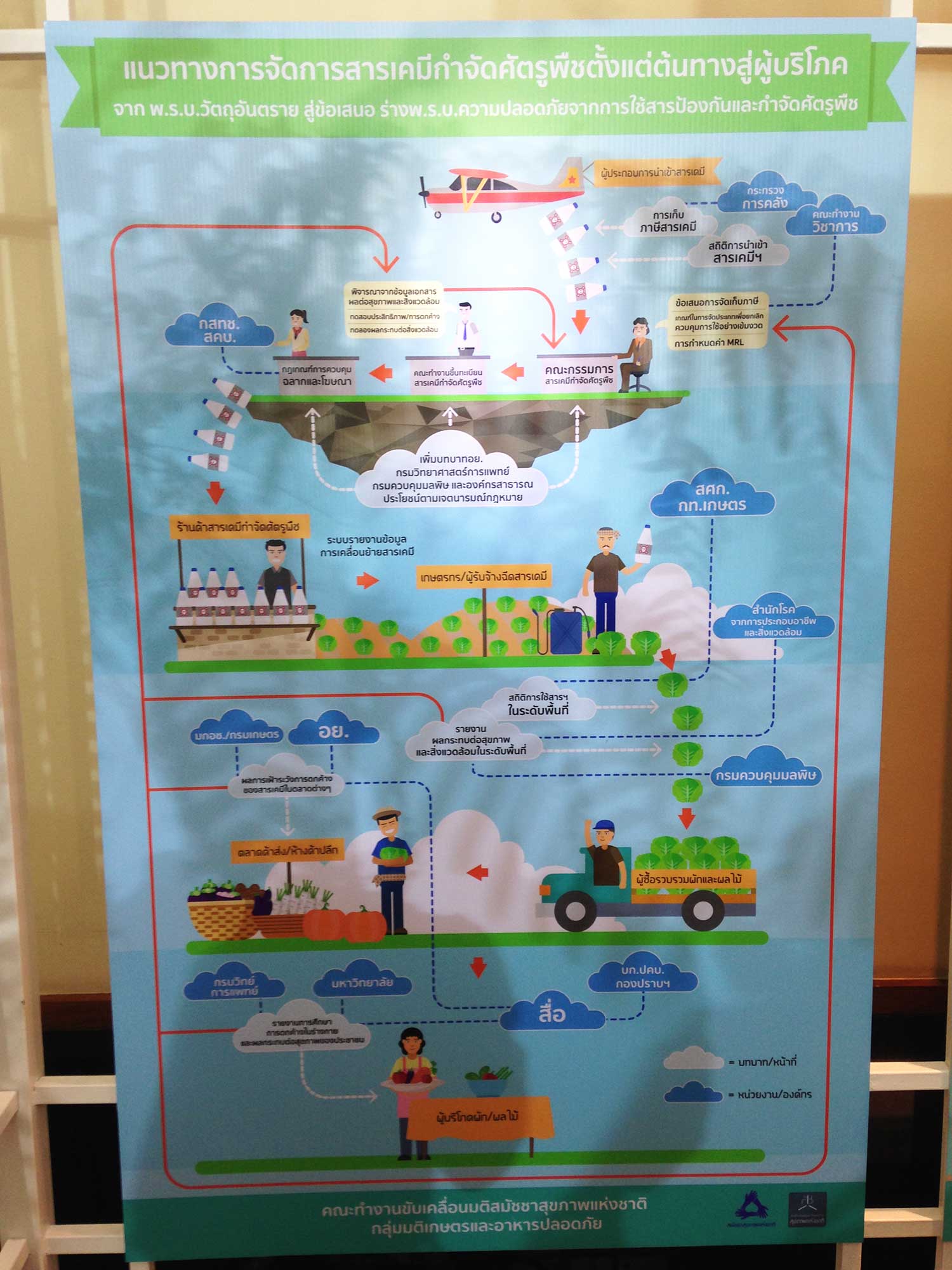
Writer: Santikorn Pakdeesettakul, Project Coordinator, Thai Rice (Nationally Appropriate Mitigation Action) NAMA
Nowadays, agricultural production widely and heavily relies on chemical pesticide application. The misuses of chemical pesticides by farmers, the failure to enforce policies and laws, and the promotion of chemical products have caused serious adverse impacts on farmers and consumers health, ecosystem, and the environment, according to the forum on “Agriculture and Food Safety” in the 9th National Health Assembly organised on 22 December 2016.

Although, Thailand has the Hazardous Substances Act B.E. 2551 (2008), it has limitations regarding farmers and consumers health protection because the Act does not only focus on pesticide management but covers all hazardous chemicals in general. Therefore, policy formulation and law enactment related to agriculture are in urgent need, particularly, the supervision of chemical pesticide registration for effectiveness and transparency, the emphasis on stakeholder participation as well as the promotion of Good Agricultural Practices (GAP).

The Forum was hosted by National Health Commission Office (NHCO), a government agency established as juristic person under supervision of the prime minister in accordance with the National Health Act B.E. 2550 and as secretariat for the National Health Commission (NHC) at Impact Forum, Muang Thong Thani, Nonthaburi, Thailand The forum has the objectives to engage relevant parties including government agencies, academic institutes, civil society organizations and private organizations to exchange and share their knowledge and views on the Draft Pesticide Safety Act which consists of key issues such as the advertising of agricultural chemicals, the sales promotion at local level, and the establishment of chemical pesticide surveillance and warning system. In addition, the success stories of agriculture and food safety implementation both at policy and local level were shared at the event.
The Draft Pesticide Safety Act comprises of 6 categories (115 sections) which can be summarized as follows.
- Preparation of pesticides list and categorization of pesticides based on acute and long-term toxicity and precautionary principle.
- Code of conduct for controlling sales promotion and advertising of pesticides such as prohibiting of sales promotion (discount, reward, giveaway, free gift, lucky draw for both merchants and buyers). Sales promotion and advertising of pesticides must not be contrary to the principles of Food and Agriculture Organization of the United Nations (FAO) and must be approved by the relevant subcommittee.
- Labeling rules and regulations
- Opportunity for stakeholders (government agencies, consumer organizations, private organizations and public) to participate in key processes such as categorization, registration, determining Maximum Residue Limits (MRL) and surveillance.
- Expert committee from academics and specialists and public benefit organizations must not involve or benefit from pesticide or related business (conflict of interest).
- Clear role of government to reduce duplication and complexity.
- Importers, producers, distributors and dealers must declare the type and amount of pesticide in their possession to the Department of Agriculture and Provincial Agricultural Extension Office on a quarterly basis.
- The Attributes of pesticide dealers, shops and distributors. For example, a salesperson must has a bachelor degree in agriculture at minimum and must be trained on the application of pesticide according to the requirement.
- The management of pesticide packaging after used to avoid negative impacts on human health and the environment.
- Penalty for violation of the Act

About 100 participants attended the Forum and they generally expressed support to the separation of the Draft Pesticide Safety Act from the Hazardous Substances Act B.E. 2551 (2008) for effective control of pesticides and protecting human health and the environment. The Act will contribute to achieving food safety and sustainable agrifood systems in Thailand.